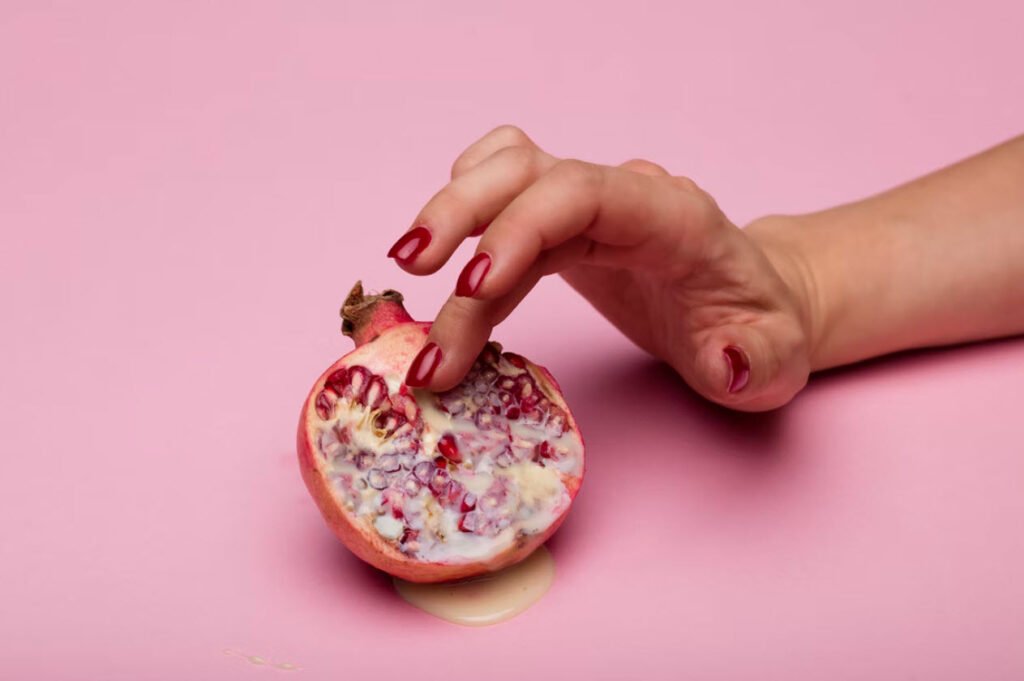A healthy diet and lifestyle can help you to keep well during pregnancy and give your baby the best possible start in life. This chapter explains some of the things you can
do to stay healthy.
What Should You Eat?
A healthy diet is very important if you are pregnant or trying to get pregnant. Eating healthily during pregnancy will help your baby to develop and grow and will help to keep you fit and well. You don’t need to go on a special diet, but make sure that you eat a variety of different foods every day in order to get the right balance of nutrients that you and your baby need.
You will probably find that you are more hungry than normal, but you don’t need to ‘eat for two’ – even if you are expecting twins or triplets. Have breakfast every day – this will help you to avoid snacking on foods that are high in fat and sugar. You may have to change the amounts of different foods that you eat, rather than cutting out all your favourites.
1) Fruit and vegetables
As well as vitamins and minerals, fruit and vegetables provide fibre, which helps digestion and prevents constipation. Eat at least five portions of fresh, frozen, canned, dried or juiced fruit and vegetables each day.
Always wash them carefully. To get the most out of vegetables, eat them raw or lightly cooked.
2) Meat, fish, eggs, beans and other non-dairy sources of protein
Protein includes meat (except liver), fish, poultry, eggs, beans, pulses and nuts. These foods are all good sources of nutrients. Eat moderate amounts each day. Choose lean meat, remove the skin from poultry and cook using only a little fat. Make sure eggs, poultry, pork, burgers and sausages are cooked all the way through.
Check that there is no pink meat and that juices have no pink or red in them. Try to eat two portions of fish a week, one of which should be oily fish.
3) Foods and drinks that are high in fat and/or sugar
This food group includes all spreading fats, oils, salad dressings, cream, chocolate, crisps, biscuits, pastries, ice cream, cake, puddings and fizzy drinks. You should only eat a small amount of these
foods. Sugar contains calories without providing any other nutrients that the body needs.
Having sugary foods and drinks too often can cause tooth decay, especially if you have them between meals. If we eat more than we need, this can lead to weight gain. Eating more fatty foods is likely to make you put on weight.
Having too much saturated fat can increase the amount of cholesterol in the blood, which increases the chance of developing heart disease. Try to cut down on food that is high in saturated fat and have foods rich in unsaturated fat instead.
4) Bread, rice, potatoes, pasta and other starchy foods
Carbohydrates are satisfying without containing too many calories, and are an important source of vitamins and fibre. They include bread, potatoes, breakfast cereals, pasta, rice, oats, noodles, maize, millet, yams, cornmeal and sweet potatoes. These foods should be the main part of every meal.
Eat wholegrain varieties when you can.
5) Milk and dairy foods
Dairy foods like milk, cheese, yoghurt and fromage frais are important because they contain calcium and other nutrients that your baby needs. Eat two or three portions a day, using low-fat varieties whenever you can – for example, semi-skimmed or skimmed milk, low-fat yoghurt and half-fat hard cheese.
Foods to Avoid
There are some foods that you should not eat when you are pregnant because they may make you ill or harm your baby. You should avoid:
1. Some types of cheese.
Don’t eat mould-ripened soft cheese, like Brie, Camembert and others with a similar rind. You should also avoid soft blue-veined cheese, like Danish blue. These are made with mould and they can contain listeria, a type of bacteria that can harm your unborn baby.
Although listeriosis is a very rare infection, it is important to take special precautions during pregnancy because even the mild form of the illness in the mother can lead to miscarriage, stillbirth or severe illness in a newborn baby. You can eat hard cheeses such as cheddar and parmesan, and processed cheeses made from pasteurised milk such as cottage cheese, mozzarella and cheese spreads.
2. Pâté.
Avoid all types of pâté, including vegetable pâtés, as they can contain listeria.
3. Raw or partially cooked eggs.
Make sure that eggs are thoroughly cooked until the whites and yolks are solid. This prevents the risk of salmonella food poisoning. Avoid foods that contain raw and undercooked eggs, such as home-made mayonnaise.
4. Raw or undercooked meat.
Cook all meat and poultry thoroughly so that there is no trace of pink or blood. Take particular care with sausages and minced meat. It is fine to eat steaks and other whole cuts of beef and lamb rare, as long as the outside has been properly cooked or sealed.
5. Liver products.
Don’t eat liver, or liver products like liver pâté or liver sausage, as they may contain a lot of vitamin A. Too much vitamin A can harm your baby.
6. Supplements containing vitamin A.
Don’t take high-dose multivitamin supplements, fish liver oil supplements or any supplements containing vitamin A.
7. Some types of fish.
Don’t eat shark, marlin and swordfish, and limit the amount of tuna you eat to no more than two tuna steaks a week (about 140g cooked or 170g raw each) or four mediumsized cans of tuna a week (about 140g when drained). These types of fish contain high levels of mercury, which can damage your baby’s developing nervous system. Don’t eat more than two portions of oily fish per week.
Oily fish includes fresh tuna (but not canned tuna), salmon, mackerel, sardines and trout.
8. Raw shellfish.
Eat cooked rather than raw shellfish as they can contain harmful bacteria and viruses that can cause food poisoning.
9. Peanuts.
If you would like to eat peanuts or foods containing peanuts (such as peanut butter) during pregnancy, you can choose to do so as part of a healthy balanced diet, unless you are allergic to them or your health professional advises you not to. You may have heard that some women have, in the past, chosen not to eat peanuts when they were pregnant.
This is because the government previously advised women that they may wish to avoid eating peanuts during pregnancy if there was a history of allergy in their child’s immediate family (such as asthma, eczema, hayfever, food allergy or other types of allergy). But this advice has now been changed because the latest research has shown that there is no clear evidence to say if eating or not eating peanuts during pregnancy affects the chances of your baby developing a peanut allergy.
10. Unpasteurised milk.
Drink only pasteurised or UHT milk which has been pasteurised. If only raw or green-top milk is available, boil it first. Don’t drink unpasteurised goats’ or sheep’s milk or eat certain food that is made out of them, e.g. soft goats’ cheese.



